Queen Elizabeth II, 1926-2022
The UK's longest-reigning monarch has passed, aged 96.
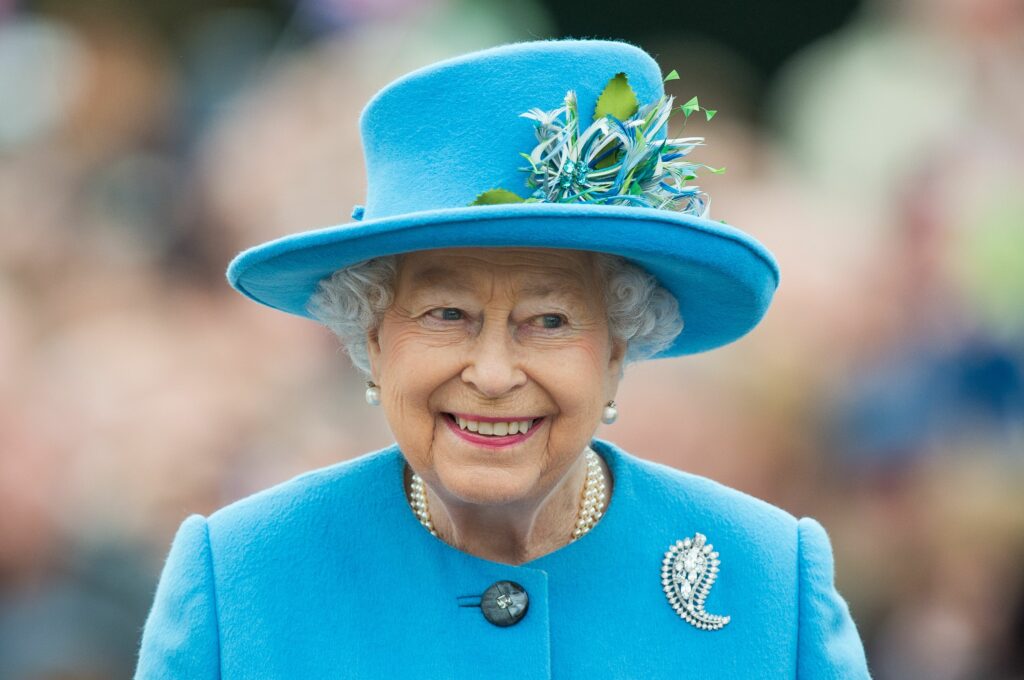
New York Times, “Queen Elizabeth II Dies at 96; Was Britain’s Longest-Reigning Monarch“
Queen Elizabeth II, Britain’s longest-serving monarch, whose broadly popular seven-decade reign survived tectonic shifts in her country’s post-imperial society and weathered successive challenges posed by the romantic choices, missteps and imbroglios of her descendants, died on Thursday at Balmoral Castle in Scotland, her summer retreat. She was 96.
The royal family announced her death online, saying she had died peacefully. The announcement did not specify a cause.
[…]
A day earlier, she met with the incoming Conservative prime minister, Liz Truss — the 15th prime minister the queen dealt with during her reign — though in doing so, because of infirmity, she broke with longstanding tradition by receiving her at Balmoral rather than at Buckingham Palace.
Elizabeth’s long years as sovereign were a time of enormous upheaval, in which she sought to project and protect the royal family as a rare bastion of permanence in a world of shifting values.
At her coronation on June 2, 1953, a year after she acceded to the throne, she surveyed a realm emerging from an empire of such geographical reach that it was said the sun never set on it. But by the new century, as she navigated her advancing years with increasing frailty, the frontiers had shrunk back. As Britain prepared to leave the European Union in 2020, a clamor for independence in Scotland was rekindled, potentially threatening to narrow her horizons yet further.
Her coronation was the first royal event of its kind to be broadcast almost in full on television. But it was a token of the changes — and global fascination — that accompanied her time as queen that her reign became the subject of a Hollywood movie and a blockbuster series on Netflix, while her family’s travails offered voluminous grist to the busy mill of social media.
Just as telling in the chronicles of her rule, Britons’ unquestioning deference to the crown had been supplanted by a gamut of emotions ranging from loyal and often affectionate tolerance to unbridled hostility. The monarchy was forced, more than ever, to justify its existence in the face of often skeptical public attention and scrutiny.
Elizabeth, though, remained determinedly committed to the hallmark aloofness, formality and pageantry by which the monarchy has long sought to preserve the mystique that underpinned its existence and survival. Her courtly and reserved manner changed little.
Statement of President Joe Biden and First Lady Jill Biden on the Death of Queen Elizabeth II
Her Majesty Queen Elizabeth II was more than a monarch. She defined an era.
In a world of constant change, she was a steadying presence and a source of comfort and pride for generations of Britons, including many who have never known their country without her. An enduring admiration for Queen Elizabeth II united people across the Commonwealth. The seven decades of her history-making reign bore witness to an age of unprecedented human advancement and the forward march of human dignity.
She was the first British monarch to whom people all around the world could feel a personal and immediate connection—whether they heard her on the radio as a young princess speaking to the children of the United Kingdom, or gathered around their televisions for her coronation, or watched her final Christmas speech or her Platinum Jubilee on their phones. And she, in turn, dedicated her whole life to their service.
Supported by her beloved Prince Philip for 73 years, Queen Elizabeth II led always with grace, an unwavering commitment to duty, and the incomparable power of her example. She endured the dangers and deprivations of a world war alongside the British people and rallied them during the devastation of a global pandemic to look to better days ahead. Through her dedication to her patronages and charities, she supported causes that uplifted people and expanded opportunity. By showing friendship and respect to newly independent nations around the world, she elevated the cause of liberty and fostered enduring bonds that helped strengthen the Commonwealth, which she loved so deeply, into a community to promote peace and shared values.
Queen Elizabeth II was a stateswoman of unmatched dignity and constancy who deepened the bedrock Alliance between the United Kingdom and the United States. She helped make our relationship special.
We first met the Queen in 1982, traveling to the UK as part of a Senate delegation. And we were honored that she extended her hospitality to us in June 2021 during our first overseas trip as President and First Lady, where she charmed us with her wit, moved us with her kindness, and generously shared with us her wisdom. All told, she met 14 American presidents. She helped Americans commemorate both the anniversary of the founding of Jamestown and the bicentennial of our independence. And she stood in solidarity with the United States during our darkest days after 9/11, when she poignantly reminded us that “Grief is the price we pay for love.”
In the years ahead, we look forward to continuing a close friendship with The King and The Queen Consort. Today, the thoughts and prayers of people all across the United States are with the people of the United Kingdom and the Commonwealth in their grief. We send our deepest condolences to the Royal Family, who are not only mourning their Queen, but their dear mother, grandmother, and great-grandmother. Her legacy will loom large in the pages of British history, and in the story of our world.
Maya Jasanoff, Harvard history professor, has a less laudatory take in the NYT (“Mourn the Queen, Not Her Empire“):
“The end of an era” will become a refrain as commentators assess the record-setting reign of Queen Elizabeth II. Like all monarchs, she was both an individual and an institution. She had a different birthday for each role — the actual anniversary of her birth in April plus an official one in June — and, though she retained her personal name as monarch, held different titles depending on where in her domains she stood. She was as devoid of opinions and emotions in public as her ubiquitous handbags were said to be of everyday items like a wallet, keys and phone. Of her inner life we learned little beyond her love of horses and dogs — which gave Helen Mirren, Olivia Colman and Claire Foy rapt audiences for the insights they enacted.
The queen embodied a profound, sincere commitment to her duties — her final public act was to appoint her 15th prime minister — and for her unflagging performance of them, she will be rightly mourned. She has been a fixture of stability, and her death in already turbulent times will send ripples of sadness around the world. But we should not romanticize her era. For the queen was also an image: the face of a nation that, during the course of her reign, witnessed the dissolution of nearly the entire British Empire into some 50 independent states and significantly reduced global influence. By design as much as by the accident of her long life, her presence as head of state and head of the Commonwealth, an association of Britain and its former colonies, put a stolid traditionalist front over decades of violent upheaval. As such, the queen helped obscure a bloody history of decolonization whose proportions and legacies have yet to be adequately acknowledged.
Elizabeth became queen of a postwar Britain where sugar was still rationed and rubble from bomb damage still being cleared away. Journalists and commentators promptly cast the 25-year-old as a phoenix rising into a new Elizabethan age. An inevitable analogy, perhaps, and a pointed one. The first Elizabethan Age, in the second half of the 16th century, marked England’s emergence from a second-tier European state to an ambitious overseas power. Elizabeth I expanded the navy, encouraged privateering and granted charters to trading companies that laid the foundations for a transcontinental empire.
Elizabeth II grew up in a royal family whose significance in the British Empire had swollen even as its political authority shrank at home. The monarchy ruled an ever-lengthening list of Crown colonies, including Hong Kong (1842), India (1858) and Jamaica (1866). Queen Victoria, proclaimed empress of India in 1876, presided over flamboyant celebrations of imperial patriotism; her birthday was enshrined from 1902 as Empire Day. Members of the royal family made lavish ceremonial tours of the colonies, bestowing upon Indigenous Asian and African rulers an alphabet soup of orders and decorations. In 1947, then-Princess Elizabeth celebrated her 21st birthday on a royal tour in South Africa, delivering a much-quoted speech in which she promised that “my whole life, whether it be long or short, shall be devoted to your service and the service of our great imperial family to which we all belong.” She was on another royal tour, in Kenya, when she learned of her father’s death.
On Coronation Day in 1953, The Times of London proudly broke the news of the first successful summiting of Mount Everest by the Sherpa Tenzing Norgay and the New Zealander Edmund Hillary, calling it a “happy and vigorous augury for another Elizabethan era.” The imperialistic tenor of the news notwithstanding, Queen Elizabeth II would never be an empress in name — the independence of India and Pakistan in 1947 stripped away that title — but she inherited and sustained an imperial monarchy by assuming the title of head of the Commonwealth. “The Commonwealth bears no resemblance to the empires of the past,” she insisted in her Christmas Day message of 1953. Its history suggested otherwise. Initially imagined as a consortium of the “white” settler colonies (championed by the South African premier Jan Smuts), the Commonwealth had its origins in a racist and paternalistic conception of British rule as a form of tutelage, educating colonies into the mature responsibilities of self-government. Reconfigured in 1949 to accommodate newly independent Asian republics, the Commonwealth was the empire’s sequel and a vehicle for preserving Britain’s international influence.
Philip Bump, WaPo (“Nine in 10 living humans were born after Elizabeth became queen“):
Queen Elizabeth II’s death Thursday afternoon brings an end to one of the longest leadership tenures in world history. For parts of eight decades, Elizabeth served as monarch of Britain, with more than 70 years passing between her ascension to the throne in 1952 and her death.
The scope of her tenure can be encapsulated quite simply. Until Thursday, at least 9 out of every 10 living human beings have never known a British monarch other than Elizabeth.
Indeed. My parents were 8 when she became Queen. My mom’s been gone now almost four years and dad more than 12. I’m almost 57 now and never knew a world without her before yesterday.
Living to be 96 is remarkable in its own right. Having significant responsibilities right through the end even more so. That she lived just long enough to install yet another prime minister is, I suppose, fitting.
Her son, the new King Charles III, is almost 74. It must be odd, indeed, to wait around that long as the heir, presumably wishing the best for your mother’s health and yet not realizing one’s purpose in life until she dies.

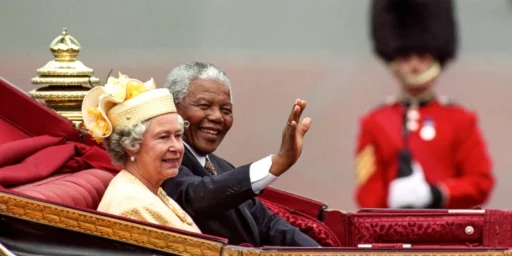
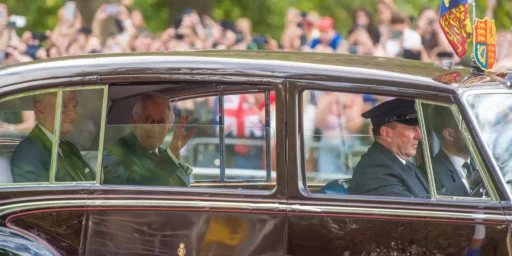
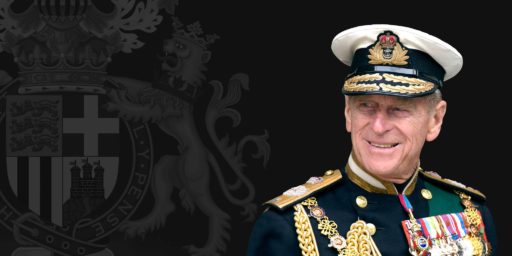
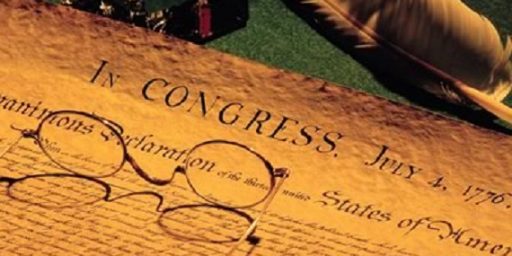
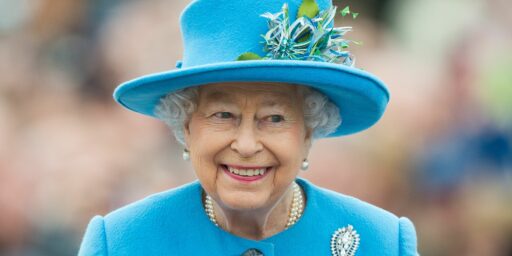
It’s the end of an era.
She could have abdicated a long time ago. That says something. As to what, I’ll leave it to others to speculate.
The Queen Mother never forgave Edward VIII for abdicating and having the burden of being King fall on her husband’s shoulders. No doubt her feelings affected her daughter.
As an academic historian wannabe, I speculated on Facebook this morning about the significance of names. Elizabeth II had Elizabeth I to look up to. Charles III has a fool (Charles I) and a rake (Charles II) as his eponyms.
Fortunately for the Royal corgis, the Church of England never adopted the funeral rites of Egyptian Pharaohs.
@SC_Birdflyte: Charles II, although a rake, was also an extremely good strategist and politician navigating the monarchy forward among the different political power groups that kept trying to control him or use him as a figurehead. He’s certainly one of the more cunning of the rulers that England has ever had.
@SC_Birdflyte:
What about the young pretender?
On other things:
I would pay to get Liz to Mar a Lago first class post haste.
@Kathy:
Well, Charles Stuart (the young pretender) was never king, though he was referred to as the “king over the water” by Jacobites. Believe it or not, there was still a Jacobite Society, dedicated to the restoration of the Stuarts to the throne, when I lived in Scotland. There may still be. Ths Jacobites regard the Windsors as a pack of Kraut arrivistes.
On the length of reign:
Had King George VI lived to the same age an Elizabeth II, she’d have only acceded in 1989.
Cases of monarchies actually skipping a generation due to first in line predeceasing are pretty frequent.
As to abdication, it’s been widely reported that the Queen regarded being an anointed and crowned monarch a binding sacrament of dedication.
(As far as I’m aware only the British monarchs are both ceremonially crowned and anointed in that way)
Basically, that she considered she was (quite literally) not entitled to abdicate.
@Argon:
The Queen stopped breeding corgis in 2015; in order according to some reports, that she should not leave them behind. How that chimes with her recently having some dogs around, I don’t know.
Regarding the Jasanoff article:
Misleading date: Jamaica was only formally categorised as a Crown Colony from 1866; but had been a colony since 1655.
And the decline of effective empire had been a reality since at least 1918.
In some ways, arguably, since Canada became a Dominion in 1867.
The Commonwealth was always just a fig-leaf for independence, first of the “white” states, then the others; signifying little more that a residuum of historical or sentimental connection.
(Genuine imperialists always tended to sneer at it: see Enoch Powell)
It was always a voluntary connection: Ireland, Burma, Aden all rejected it.
IIRC it was never considered for formal mandates and protectorates and “oddities” like Egypt, Jordan, Iraq, the Emirates, Sudan etc.
But some countries that were neve in the Empire have joined: Rwanda, Cameroon, Gabon and Madagascar.
I suspect Jasanoff is another person with a rather Procrustean approach to fitting history into a nice theoretical framework,
@OzarkHillbilly:
No no no no no. Do not read anything into her not abdicating other than the entire royal family considered her uncle’s abdication incredibly shameful. The role is the job until death. Full stop.
@Jen:
Agreed. Elizabeth vowed to serve her entire life, “whether it be short or long,” and she did. She regarded it as her sacred duty.
@grumpy realist: True. And he was a damn sight better than his younger brother James.
@CSK: I mentioned in a forum elsewhere that I’ve always been partial to the House of Saxe-Coburg-Gotha, despite the brevity of their time in power (at least under that name). Prince Albert, never a king, did as much as anyone to shape the evolution of the monarchy.
Typically monarchs who want to retire but not abdicate, pass to the heir much of the work they no longer want to, or can, do. But without a formal abdication, they have to keep doing all the meaningless, ceremonial crap most of the time.
@SC_Birdflyte:
Personally, I’ve never been one for that “rename the dynasty out of deference to dimwitted public opinion” nonsense.
I’d prefer it if old definitions held: dynasty name changes with the marital line, hence Her Majesty was the last monarch of the House of Saxe Coburg Gotha.
But if she was happy with Windsor, I suppose that settles it.
Some arguments aren’t worth having.
@Kathy:
The Queen was already going along that route; she’d handed over almost all the day-to-day work to Charles, and even some “political ceremonial” like the State Opening of Parliament.
In turn, Charles has handed off a lot of the time consuming walkabouts and charity stuff to William.
@JohnSF:
George V changed it in 1917 in response to anti-German sentiment, correst?
@CSK:
Correct.
He should have told the peasants to shove it, IMO.
And then proclaimed German as the new official language of the Court.
(Neither diplomacy nor suffering fools gladly being numbered among my strong suits)
@JohnSF: I think I’m like a lot of others here in the colonies who feel the monarchy is just another charming peculiarity of the English, like driving on the left, misnaming the floors of a building and drinking their beer warm. That it is a fiction, a play monarchy with all of the pomp and none of the power. But if that’s true Elizabeth played the part well, and with dignity. She seemed every bit the queen.
A few decades ago, before I became what Bush the elder called a tassel shoed lawyer, I was a pilot in the Marine Corps and attended a military school with a couple of British exchange pilots. They were both a couple of fun guys and we had many a discussion over (cold) beers. They were both pretty Meh about the monarchy in general, but had great affection, even love for the Queen personally.
I expect the future of the monarchy may depend on whether Charles can engender the respect and affection that the Elizabeth had.
@a country lawyer:
Oh, we know quite a few American think us a bit odd over the monarchy.
There’s a not inconsiderable number of British who are inclined to republicanism, for that matter.
So we don’t tend to mind people thinking it’s all an archaic pretence.
But the deepness of it, the heart of it, is that all society, looked from a certain angle, is about shared illusions and an aesthetic rather than just power and pragmatism.
It’s perhaps easier, at least for us, to feel affection and a sense of historical continuity embodied and symbolized in a person than as purely abstract or legal concept.
A historic common thread, and personalised focus of loyalty.
Of course, Americans (and French, and Irish, etc.) may beg to differ. 🙂
At any rate, the mantle of the shared dream will fall upon Charles now; all he need to is avoid being too clumsy in the wearing of it.
However, one thing I must protest, sir.
With great vehemence, bordering on outrage at the brazen slander of it!
Brits. Do. NOT. Drink. Beer. Warm.
Beer is properly drunk at cellar temperature: 7 to 10°C or 45 to 50°F.
If you consider that warm, sir I invite you to spend a an hour in a t-shirt in said cellar. 🙂
Much colder than that and you lose the flavour.
Which, thinking on it, is probably an advantage, if you’re drinking American Budweiser or suchlike. 😉
@Jen: C’mon Jen, it’s English, you speak the language. What I said was She could have abdicated a long time ago. That says something. As to what, I’ll leave it to others to speculate.
I read nothing into it, just said that it meant something.
And then here you come along and speculate that it means “her uncle’s abdication (was) incredibly shameful. The role is the job until death.” which may well be true. It would also be an incredibly stupid reason to hang onto the crown. But that’s just one American’s opinion which also reflects the light I hold the monarchy in.
All that being said, I dropped in to share this:
If you loved the Queen it will make you laugh. It should make you laugh even if you didn’t.
@JohnSF: Brits. Do. NOT. Drink. Beer. Warm.
I stand corrected sir, and I certainly won’t defend Budweiser!
@a country lawyer:
S’okay.
I mean, if only warm beer was available, I’d probably drink it.
If no beer was available, I’d even consider Budweiser. 😉
@JohnSF: A buddy of mine had a saying about the different types of beer. The upshot of it was that one should never question free beer. Warm, cold, cheap, expensive, whatever… If somebody offered, you took it.
My favorite warm beer memory:
We’d been up on the El Abra chopping jungle for a long and very frustrating week. The El Abra is the ass end of nowhere, a place no sane person would ever willingly go, and in fact no sane person had been to in decades. But it’s true wilderness, the home of jaguars and deer and vampire bats and fer-de-lances and many other critters large and small, most of whom one hopes to never meet on a narrow jungle trail. And no surface water. It’s a f’n sponge. The rain that falls on the El Abra immediately disappears into the ground, only to show up miles away and thousands of feet lower. If you want to drink it, you have to bring it.
Anyway, like I said, no sane person would ever willingly go there. Hence, I was there. Anyway, after a weeks chopping and not quite reaching our objective, we finally gave up and turned around to answer the incessant calls of the more civilized world. When we finally arrived back at our truck, foot weary and a little more bent, we took a moment to relish the feel of an unladen back and wish momentarily for a beer. Then put the thought out of our thirsty minds because we had 30 miles of bad road to navigate (if you could call what we’d hacked out of the jungle on the way up a “road”) and then another hours drive to the nearest town. We were enjoying some quiet conversation before facing the next and hopefully last endurance test on our return to civilization when I first heard a distant rumble.
Could it be???
“Hey… Quiet. Everybody STFU!”
We all listened carefully and…
“You have got to be f’n kidding me…”
A minute or 2 later an SUV pulled up behind our truck and 3 young American kids (kids… They were college aged) got out. WTF????
Turned out one of them was the son of one of the original cavers to explore the El Abra, had grown up on his father’s tales of derring doo and had always wanted to chop in his father’s footsteps. We had a real good laugh at their good luck in arriving just as we had had to give up after chopping 95% of the jungle between them and Cuesta and Estrella beyond it.
After 10 or 15 mins of conversation it finally occurred to me to ask, “Hey, you guys wouldn’t happen to have any beer would ya?”
“Yeah, but it ain’t too cold, most of our ice melted on the way up.”
No beer ever tasted better.
ETA: it being Mexico, they had Coronas.
@OzarkHillbilly:
Ah, caves and streams.
Many years past, on a very warm day, was on a school trip to Upper Ribblesdale.
Where there be caves.
Left some cans of beer wedged under a tree root in a tributary of the Ribble while going off to survey water flow in caves and whatnot.
Perfect temperature when we got back . 🙂
@JohnSF: Caves make good beer coolers.
@JohnSF:
Wouldn’t she technically have been the first monarch of the House of Schleswig-Holstein-Sonderburg-Glücksburg, and George VI the last of the House of Saxe-Coburg-Gotha?